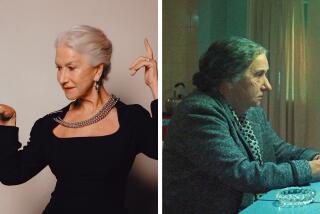Only a hair off when it comes to the details
- Share via
“Nip/Tuck,” season premiere, Oct. 30, FX, 10 p.m.
The premise: Dr. Christian Troy (Julian McMahon) and Dr. Sean McNamara (Dylan Walsh) have moved their cosmetic plastic surgery practice from Miami to Beverly Hills. They are having trouble competing with established surgeons who operate on local celebrities, so they hire a publicist who gets them a job with a TV drama about plastic surgeons. Sean gives Christian hair plugs so he will look better on TV, but the plugs become infected (a condition known as folliculitis), which Sean says is unusual. He swabs the area with antibiotic solution so that the infection will heal in time for the TV appearance three days later.
During the episode, Christian romances Carly Summers (Daphne Zuniga), a 40-year-old actress who wants to look younger so she can land a new movie part. Christian suggests calf implants, liposuction of the thighs and torso, a breast lift and augmentation, silicone cheek enhancers, and “feather lifts” of the forehead, cheeks and chin.
Sean and Christian are also treating Bob Easton (Craig Bierko), the chief executive of a film studio who is submitting to frequent bites by a dominatrix. As Sean tries to repair bite wounds on Bob’s chest, he cautions that a “cesspool lives in the human mouth” and that Bob is risking bacterial infection and hepatitis.
The medical questions: Are hair transplants rarely infected and easily treated? Would they grow in rapidly enough to make a difference for Christian’s TV appearance? Are multiple cosmetic procedures to restore youthful appearance easily combined? Are human bites easily infected?
The reality: Folliculitis is an itchy, acne-like, pus-filled infection that can occur in clogged hair follicles. Mild folliculitis, such as that experienced by Christian, is very common a few days after hair transplant surgery and can resolve spontaneously. Local antibiotic creams or lotions may adequately treat a small number of infected pimples, but a larger infection generally requires oral antibiotics and may necessitate removal of the plugs. There is also potential for bleeding and scarring.
Dr. James P. Bradley, associate professor of plastic surgery and chief of pediatric plastic surgery at UCLA, says that the show’s rapid three-day timetable for new hair growth is unrealistic. “It may take six weeks or more to see the beginning of their growth,” he says.
Cosmetic procedures have improved over the years and now have a lower risk of infection, bleeding and scarring. Multiple procedures can be combined as the show depicts and are often done so in so-called extreme makeovers, Bradley says. (He adds that too many procedures can lead to an unnatural look.)
As for the antics of chief executive Bob: Deep human bites can be treated surgically and, in the hands of a talented plastic surgeon, scarring can be minimized. However, the risk of infection from bacteria in the human mouth is high: Infections from skin-breaking human bites occur at a rate of 10% to 15%. There are as many as 190 species of bacteria in the mouth -- and a greater number of pathogenic (or disease-causing) types than are found in the human rectum. Human bites are more infection-prone than dog bites. They have been shown to transmit hepatitis B and C, syphilis, tuberculosis, tetanus and, most likely, HIV, although the last is extremely rare.
In fact, unlike the show’s depiction, plastic surgeons typically will not close wounds from human bites at all, but will wash them out with antimicrobial solutions to prevent infection.
--
Dr. Marc Siegel is an internist and an associate professor of medicine at New York University’s School of Medicine. He is also the author of “False Alarm: The Truth About the Epidemic of Fear.” In The Unreal World, he explains the medical facts behind the media fiction. He can be reached at marc@doctorsiegel.com.
More to Read
The complete guide to home viewing
Get Screen Gab for everything about the TV shows and streaming movies everyone’s talking about.
You may occasionally receive promotional content from the Los Angeles Times.






